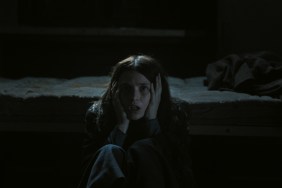Writer Jessica Ferri gets inside of you with a feminist spin on the centuries-old possession genre. Read on…
Reading the news today, you might think you’d been transported back through some portal to the 1970s… or even the 1950s. Just a few days ago, BuzzFeed ran a story with the headline “What It’s Like to Get an Illegal Abortion,” and The Huffington Post reported that a Texas lawmaker said, “Jail Time for Abortion Would Make Women ‘More Personally Responsible’ for Sex.”
Horror movies frequently step in to comment on cultural issues, when despite all the internal screaming we are still bereft of some kind of emotional release. It’s no surprise that Rosemary’s Baby, perhaps one of the most brilliant examples of this kind of cultural commentary, was made in 1968, the same year both Martin Luther King, Jr. and Robert Kennedy were assassinated, and women across the United States were taking a stand when it came to their reproductive rights. It’s hard to believe that the birth control pill wasn’t legalized for all American women until 1972. So Rosemary’s plight, as a woman who has no control over her own body, was essentially the plight of every woman in America.

Rosemary isn’t possessed herself, of course – but she is pregnant, which is its own form of invasion. The baby makes her sick. She loses weight instead of gaining it, hallucinates, frequently faints, and practically dies. After all, she’s pregnant with the spawn of satan. But, in general, most women would agree that the feeling of something growing and moving inside you is probably more Alien (at least at first) than it is Look Who’s Talking.
1973’s The Exorcist takes the female body even farther to the extreme, this time invading the body of the sweet teenage Regan and morphing her into a foul-mouthed, green-bile spewing demon in perhaps one of the most intense allegories to puberty that has ever graced the silver screen. Like Rosemary, Reagan and her mother Chris are two women on their own. As Rosemary’s husband’s career takes off, she is frequently left alone in the apartment, at the mercy of her strange neighbors. Alison, in 1977’s The Sentinel faces off against some ancient evil similarly alone, as a single woman living in a giant apartment complex in New York.

It’s always teenage girls or young women who find themselves the victims of demonic possession. A quick run through of “exorcism” movies, and you’ll find: Possession, The Exorcism of Emily Rose, The Last Exorcism, The Possession, Stigmata, and many more that feature female victims. One exception to the rule is 1976’s The Omen, in which the spawn of satan is a male child, and the narrative is focused mostly on his adoptive father, ambassador Robert Thorn, played by Gregory Peck. But Damien enters their lives in another instance of a woman being denied choice. Thorn’s actual baby dies shortly after he’s born, and the priest conveniently convinces Thorn to adopt an orphaned child. No one thinks to tell his wife Katherine of the switch, or that her baby is dead. Big mistake.
What is it about these women that makes them so vulnerable to the devil’s wiles? Perhaps it’s Reagan’s recent move to Washington, D.C., her inability to fit in at school, or the raging hormones of a teenage girl, sex-crazed, or the fact that she’s become the victim of a deranged stepfather or father, the victim of rape or incest, or, like Patricia Arquette’s Frankie, in Stigmata, she’s just an atheist girl trying to live her life in Pittsburgh? It would be easier to say there’s only one thing these women have in common: They are beyond the control of men, and they are female.

One film takes the genre to a particularly terrifying place – Andrzej Zulawski’s aptly-titled Possession, starring Isabelle Adjani and Sam Neill. In this allegory on infidelity and female hysteria, the rage Adjani’s character Anna feels towards her husband is palpable. He knows she’s having an affair, neglecting her duties at home as a wife and mother to their young child, but what he doesn’t know is who… or what she’s having an affair with. Anna’s story speaks generally to the absolute pinnacle of male anxiety and paranoia. The original trailer describes the film as “two men… and a woman no man could ever possess.” If women’s bodies are not owned by their husbands, or lovers, or by the state, then they must be vulnerable to the absolute, first evil.
The fact of the matter is, that that vulnerability and danger is seen through the eyes of men: of male priests, of father figures, of husbands all too eager to sell their wives’ wombs to the devil. If women’s bodies are subject to government control, then no one is safe. A woman without reproductive rights is a woman without rights.

One horror film last year was probably my favorite movie of the year, regardless of genre. It was a groundbreaking film mired in these same issues: male control over the female spirit, through religion, body, and mind. The suggestion of incest and rape was there. The devil was there. But this time, the movie was told from the female perspective. It was Robert Eggers’ The Witch. The young women who appear as victims in demonic possession movies are like witches, from a societal standpoint. As young women, or single women, they are outside the “protection” of the family, or the husband. But Thomasin, the heroine of The Witch, is anything but a victim.
There’s an infamous scene in Possession, when Isabelle Adjani completely loses it in a subway station, carrying her groceries home. Mention “the subway scene” to anyone who’s seen the film and they’ll immediately know what you’re talking about. Let’s just put it this way: Deprive women of their essential human rights and that subway scene is just the tip of the iceberg. Now, more than ever, women are possessed. Possessed by a righteous desire to live their own lives and make their own choices. That, is essentially the very definition of liberty.
READ MORE IN JESSICA FERRI’S “ON” SERIES…
Merry X-Mas: On Holiday Horror









